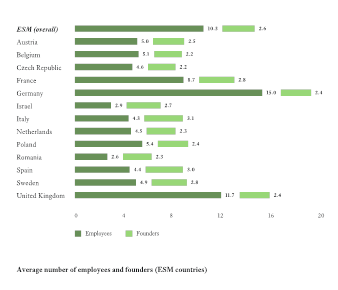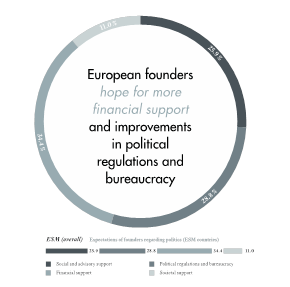Entrepreneurship is a key driver of economic growth and employment and Europe today more than ever needs new talented entrepreneurs to start businesses, create new jobs and develop skills. Young enterprises generally have to find ways of surviving in a tough environment, as education usually does not support the brightest minds willing to begin their career in a start-up, given the difficulty in raising funds or the bureaucratic and administrative burden particularly at an early-stage. Understanding the opportunities and challenges related to the creation of new enterprises as well enabling a conducive environment to make the start-up ecosystem prosper is vital for Europe to unleash its innovation potential.
The European Startup Monitor (ESM), initiated by the German Startups Association, creates transparency for the European startup ecosystem and underlines the growing influence of these young enterprises on the European economy.
For the first time, the ESM supplies valid data from all EU-countries and Israel. The ESM represents over 2,300 startups with more than 31,000 employees. It provides a comprehensive long-needed overview of important characteristics, potentials and challenges in the European startup landscape. Günther Oettinger, the European Commissioner for Digital Economy and Society, stresses: “The European Startup Monitor will allow for a systematic overview of where innovation and growth happens in the digital economy, and how policies should be shaped to help.” The ESM has been published with the support of KPMG, Telefónica und Google.
Profile of founders and employees

On average, European startups are 2.5 years old. One of the most surprising findings of the study is the low proportion of female founders, amounting only to 14.7%.
 A further interesting finding is the internationality of both founders and employees: 11.9% of the founders are from countries other than the location of their startup. Almost one third of employees come from abroad. The country with the highest share of both international founders and international employees is the United Kingdom.
A further interesting finding is the internationality of both founders and employees: 11.9% of the founders are from countries other than the location of their startup. Almost one third of employees come from abroad. The country with the highest share of both international founders and international employees is the United Kingdom.
Markets and Internationalization
 European Startups are operating in an international environment. 21.2% have entered other European markets while further 29.8% have entered international markets. 8 out of 10 startups plan a further internationalization in the next 12 months.
European Startups are operating in an international environment. 21.2% have entered other European markets while further 29.8% have entered international markets. 8 out of 10 startups plan a further internationalization in the next 12 months.
Financing sources: European founders depend on own savings, family & friends
The study finds that the major capital source is own savings of the founders (69.1 %), followed by support from family and friends (25.1 %). Only as third source of capital, founders rely on governmental funding programs and subsidies (21.9 %). To generate fast growth, venture capital and other forms of private investments should be supported by a suitable political framework.
Startups as job engines
 On average, startups create 12.9 jobs after 2.5 years (including founders). Germany leads the way with 17.4 jobs, followed by the United Kingdom (14.1 jobs) and France (11.5 jobs). These figures prove the significant impact, which European startups have developed on the European labor market.
On average, startups create 12.9 jobs after 2.5 years (including founders). Germany leads the way with 17.4 jobs, followed by the United Kingdom (14.1 jobs) and France (11.5 jobs). These figures prove the significant impact, which European startups have developed on the European labor market.
Expectations on politics

The ESM has identified three main expectations of startup founders with regard to policy-makers: First, they wish for more financial support; second, they wish for an improvement of political regulations and a reduction in bureaucratic constraints; and third, founders wish for better social and advisory support.
For further information and all findings of the study please visit europeanstartupmonitor.com.
 Lisa is Head of Research and International Strategy at the German Startups Association. She has graduated from ESCP-Europe with a Master of Science in European Management. She has lived, worked and studied in Berlin, Cambridge and New York and has long term experience in the consulting and governmental sectors. Her areas of expertise are international relations, intercultural competence and business strategy. For the German Startups Association, Lisa is working on European relations, creating a network for European startups to share experiences and contacts. Lisa is further in charge of the European Startup Network. As a network manager, she regularly visits other European startup representatives, startup related events and the European Commission in Brussels.
Lisa is Head of Research and International Strategy at the German Startups Association. She has graduated from ESCP-Europe with a Master of Science in European Management. She has lived, worked and studied in Berlin, Cambridge and New York and has long term experience in the consulting and governmental sectors. Her areas of expertise are international relations, intercultural competence and business strategy. For the German Startups Association, Lisa is working on European relations, creating a network for European startups to share experiences and contacts. Lisa is further in charge of the European Startup Network. As a network manager, she regularly visits other European startup representatives, startup related events and the European Commission in Brussels.



